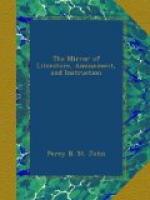The prince, suspecting there might be a concealed listener, and that it was the king, pursued his wild and frantic acts, hoping that by some lucky chance he might discover his hiding-place. Watchful of all that passed in the room, as he dashed from side to side, he descried a little movement of the uneasy courtier’s covering. Suddenly Hamlet sprung on his feet, began to crow like a cock, and flapping his arms against his sides, leaped upon the straw; feeling something under him, he snatched out his sword and thrust it through the unfortunate lord. The barbarism of the times is most shockingly displayed in the brutal manner in which he treats the dead body; but for the honour of the Danish prince, we must suppose that it was not merely a wanton act, but done the more decidedly to convince the king, when the strange situation of the corpse was seen, how absolutely he must be divested of reason. Being assured he was now alone with his mother, in a most awful manner he turns upon her, and avows his madness to be assumed; he reproaches her with her wicked deeds and incestuous marriage; and threatens a mighty vengeance upon the instigator of her crime.
In the historian we find that the admonitions of Hamlet awakened the conscience of the queen, and recalled her to penitence and virtue. The king, observing the change, became doubly suspicious of the prince; and baffling some preliminary steps he took to vengeance; Hamlet was entrapped by him into an embassy to England. He sent along with him two courtiers, who bore private letters to the English monarch, requesting him, as the greatest favour he could confer on Denmark, to compass, by secret and by sure means, the death of the prince as soon as he landed. Hamlet, during the voyage, had reason to suspect the mission of his companions; and by a stratagem obtaining their credentials, he found the treacherous mandate; and changing it for one wherein he ordered the execution of the two lords, he quietly proceeded with them to the British shore. On landing, the papers were delivered, and the king, without further parley, obeyed what he believed to be the request of his royal ally; and thus did treason meet the punishment due to its crime. The daughter of the king being charmed with the person and manners of the foreign prince, evinced such marks of tenderness, that Hamlet could not but perceive the depth of his conquest. He was not insensible to her attractions; and receiving the king’s assent, in the course of a few days led her to the nuptial altar. Amidst all joys, he was, however, like a perturbed ghost that could not rest; and before many suns had rose and set, he obtained a hard wrung leave from his bride, once more set sail, and appeared at Elsineur just in time to be a witness of the splendid rites which Fengo (supposing him now to be murdered) had prepared for his funeral. On the proclamation of his arrival, he was welcomed with enthusiasm by the people, whose idol he was, and who had been overwhelmed




